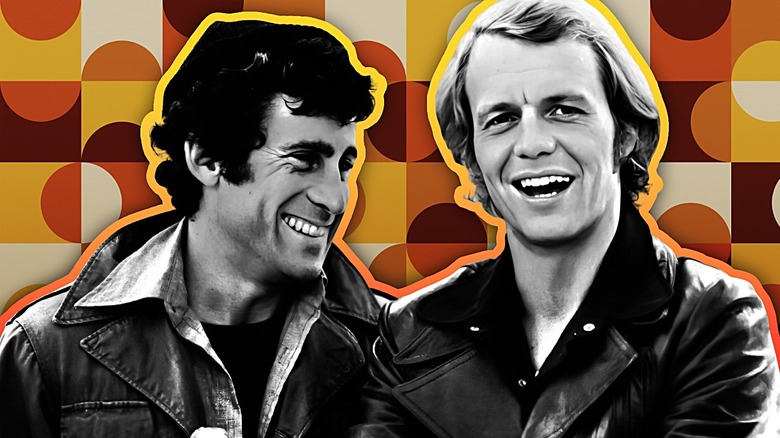The Only Main Actors Still Alive From Starsky And Hutch
Out of all the action dramas that graced the airwaves in the 1970s, "Starsky & Hutch" may have had the most style. Starring David Soul and Paul Michael Glaser as one of television's most iconic police officer duos, it aired for four seasons between 1975 and 1979. Although their approach to policework may have been different, they were united in their efforts to keep the streets of Bay City (a fictional town in Southern California) clean. As many cities across the country grappled with what was considered a crime epidemic during this time, the frank but engaging manner in which "Starsky & Hutch" dealt with these issues struck a chord with audiences. Its grip on popular culture remained strong long after it was canceled, even generating a moderately successful (though poorly reviewed) film adaptation in 2004, starring Ben Stiller and Owen Wilson as Starsky and Hutch.
Since the show has been off the air for quite some time — and considering the fact that it had a small main cast to begin with — it stands to reason that there aren't many actors who starred on "Starsky & Hutch" around anymore. In fact, after we lost David Soul in January 2024, there were just two members of the cast left: Paul Michael Glaser and Antonio Fargas.
Paul Michael Glaser (Dave Starsky)
Paul Michael Glaser played one half of the titular detective duo in "Starsky & Hutch": the street smart, emotionally intense David Starsky. Glaser got his start as an actor in 1971, when he starred as the Russian revolutionary Perchik in "Fiddler on the Roof," who causes trouble when he proves an unconventional love match for Tevye's second daughter, Hodol. Since then, he has been a near constant presence in Hollywood, both as an actor (he appeared in the Oscar-nominated "Butterflies Are Free" alongside Goldie Hawn, "Something's Gotta Give," and a handful of episodes of "Ray Donovan," amongst many other projects) and as a director ("The Running Man," "The Cutting Edge"). In 1985, he was nominated for an Emmy for his work as a director on the television series "Miami Vice."
Outside of his work in the entertainment industry, he has been active in a cause extremely close to his heart. He is the honorary chairman of the Elizabeth Glaser Pediatric AIDS Foundation, which was started by his wife when she was diagnosed with AIDS in the mid-1980s as a result of a blood transplant she received while giving birth years earlier. This diagnosis was shared by both of their children, Ariel and Jake, and Ariel sadly passed away in 1988, followed by her mother's death six years later. Their mission statement explains that they seek "sustained, high-quality, locally led HIV/AIDS epidemic control for children, youth, and families that achieves our ultimate hope for a healthy, AIDS-free generation."
Antonio Fargas (Huggy Bear)
Antonio Fargas, who played the police informant Huggy Bear, was the beating heart of "Starsky & Hutch," and his tremendous screen presence was a huge part of the show's success. Throughout the 1970s, Fargas made a name for himself in the popular blaxploitation genre, with roles in films like "Shaft," "Cleopatra Jones," and "Foxy Brown." And his career was still hot enough decades later that he also appeared in the blaxploitation parody "I'm Gonna Git You Sucka" and the hood comedy "Don't Be a Menace to South Central While Drinking Your Juice in the Hood."
Although Fargas has acted in many films, he never left his TV roots behind, appearing in 27 episodes of "Everybody Hates Chris" between 2005 and 2009. Now in his late 70s, he has continued to act on a regular basis, and currently has one project in the works: "Deep," a drama by Sharice Henry Lamb in her feature directorial debut. In a Consciousness Magazine interview for his 2013 film "Silver Bells," he spoke about his evolving interest in acting, noting that after working in the industry for over 50 years, he's increasingly focused on projects that allow him to express his faith and contribute to theater programs within his community, like the West Las Vegas Art Center.


